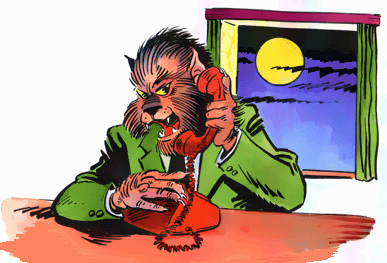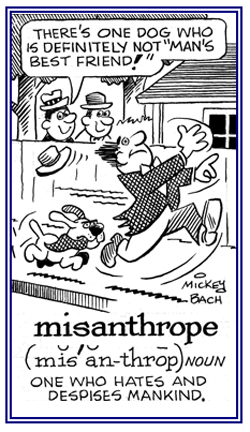anthrop-, anthropo-, -anthrope, -anthropic, -anthropical, -anthropically, -anthropism, -anthropist, -anthropoid, -anthropus, -anthropy
(Greek: man, mankind; human beings; including, males (man, men; boy, boys) and females (woman, women; girl, girls); all members of the human race; people, humanity)
The study of linguistic anthropology developed an interest in the relations between language and culture and in the role that language might play in the habitual actions or conduct toward each other.
2. Etymology: the term comes from ancient Greek lykánthropos; lýkos, "wolf" + ánthropos, "mankind, human".
Other applicable terms include: insania lupina; melancholia canina; melancholia zooanthropic.
There were those who thought that there could be a magical lycanthropic transformation of someone into a wolf.
Lycanthropy was also the kind of witchcraft which made a person assume that he or she had the form and the nature of a wolf.

A lycanthrope is trying to get counseling during his monthly full-moon phase, but the service is busy.
Lycanthropy, the changing of men into wolves has been found over the centuries in literature and folklore through out the world
The term, werewolf, comes from the Latin vir for "man", literally, "man-wolf"; in Russia, the oborol; in Portugal, the lobishomen; in France, the loup-garou; and in Scandinavia, the vagr.
In medieval days, suspected werewolves were sometimes flayed alive in the search for the dreaded wolf skin hidden beneath their human one. While other man-into-beast stories certainly exist, like the frenzied bear-shirters, or "berserkers", of Scandinavian origin, there are far more accounts of people being changed into wolves.
Lycanthropy is mentioned by Herodotus and Pliny, and there is even a section of the 11th-century treatise Decreta dealing with werewolves who seek absolution. King James VI of Scotland gave an unusually sensitive account of the warwoolfe in his Demonologie of 1597, calling it "a natural superabundance of melancholie."
2. Anyone who avoids social contacts with people whenever possible: Irene was always a very shy person, even when she was a child; and as a grown-up, she had a tendency to be a misanthrope because she preferred being alone at home and not with other people.
3. Etymology: from Greek misanthropos, "hating mankind"; from misein, "to hate" + anthropos, "man".
A misanthrope is a person who always believes the worst about other people, at first, and never changes his or her mind.
Someone who has little faith in mankind, and even less in womankind.

Go to this Word A Day Revisited Index
so you can see more of Mickey Bach's cartoons.
2. Referring to avoiding the company of other people because of a strong preference to be alone and away from others: If anyone says something, or does anything, that is especially hostile or obviously untrue; this is probably coming from a misanthropic individual.
In Walden, the author, Henry David Thoreau, describes his misanthropic and solitary life in the woods, where he lived alone, at least a mile away from any neighbor and had a quiet and independent life.
2. Characterized by believing the worst about human nature and motives: As a misanthropical person, Burton usually stayed away from people as much as possible; so, he only left his apartment to go shopping for necessities very early in the morning and he earned a living by working with his computer at home instead of associating with others at a job site.
2. A pessimistic distrust of people in general which is expressed in thoughts and behavior: After being extremely disappointed by his school friends, when he was young; and his girlfriend, when she stole his money and went away with another guy, Martin developed a misanthropy and decided he would live by himself and not get involved with any further relationships.
Without Contraries is no progression. Attraction and Repulsion, Reason and Energy, Love and Hate, are necessary to Human existence.


